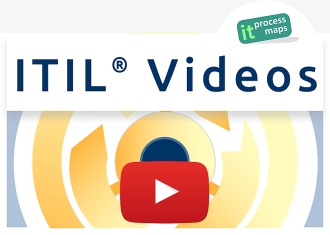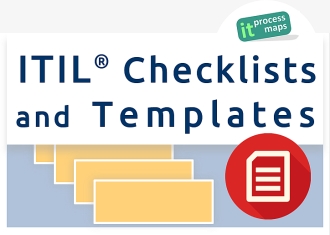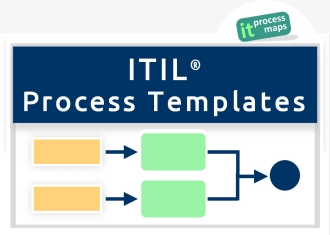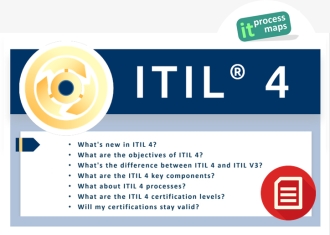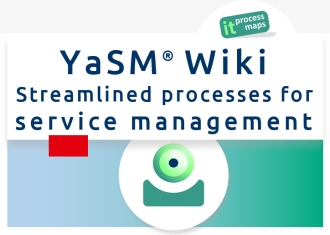IT Service Continuity Management - ITIL V2: Difference between revisions
mNo edit summary |
No edit summary |
||
| Line 22: | Line 22: | ||
==Sub-Processes== | ==Sub-Processes== | ||
[[Image:overview_itscm.jpg| | [[Image:overview_itscm.jpg|thumb|739px|none|link=https://wiki.en.it-processmaps.com/index.php/File:Overview_itscm.jpg|Overview of IT Service Continuity Management]] | ||
'''Carry out ITSCM Risk Analysis''' | '''Carry out ITSCM Risk Analysis''' | ||
*Process objective: Identification of the risks from a business viewpoint and linking those risks to IT Services and infrastructure components. | *Process objective: Identification of the risks from a business viewpoint and linking those risks to IT Services and infrastructure components. | ||
'''Create [[ITIL Glossary#IT Service Continuity Plan|IT Service Continuity Plan]]''' | '''Create [[ITIL Glossary#IT Service Continuity Plan|IT Service Continuity Plan]]''' | ||
*Process objective: Identification of measures with the aim of being prepared for potential disasters; establishment of the organizational conditions for disaster precaution. | *Process objective: Identification of measures with the aim of being prepared for potential disasters; establishment of the organizational conditions for disaster precaution. | ||
'''Determine Technical Measures for Containing Risks''' | '''Determine Technical Measures for Containing Risks''' | ||
*Process objective: Determination of concrete technical measures in order to reduce the risks in association with events of disaster; compilation of corresponding RFCs. | *Process objective: Determination of concrete technical measures in order to reduce the risks in association with events of disaster; compilation of corresponding RFCs. | ||
'''Commission Measures for the Increase in Availability ''' | '''Commission Measures for the Increase in Availability ''' | ||
*Process objective: After the successful clearance of the Change, the implementation planning is to be detailed; subsequently the implementation is commissioned to suitable technical experts within Application or Infrastructure Management. | *Process objective: After the successful clearance of the Change, the implementation planning is to be detailed; subsequently the implementation is commissioned to suitable technical experts within Application or Infrastructure Management. | ||
'''Carry out Organizational Measures for Containing Risks''' | '''Carry out Organizational Measures for Containing Risks''' | ||
*Process objective: Definition and implementation of organizational measures in order to be prepared for the event of a disaster. | *Process objective: Definition and implementation of organizational measures in order to be prepared for the event of a disaster. | ||
'''Practice the Event of Disaster''' | '''Practice the Event of Disaster''' | ||
*Process objective: The prepared arrangements for the event of a disaster are to be submitted to a realistic test, in order to confirm that these arrangements are functional and sufficient. | *Process objective: The prepared arrangements for the event of a disaster are to be submitted to a realistic test, in order to confirm that these arrangements are functional and sufficient. | ||
'''Carry out ITSCM Reporting''' | '''Carry out ITSCM Reporting''' | ||
*Process objective: Reporting on changes to the risk-situation as well as on the status of counter-measures for the preparation for disaster events. | *Process objective: Reporting on changes to the risk-situation as well as on the status of counter-measures for the preparation for disaster events. | ||
==Involved Roles== | ==Involved Roles== | ||
| Line 61: | Line 51: | ||
*[[ITIL Roles#Test-QS-Manager|Test and QS Manager]] | *[[ITIL Roles#Test-QS-Manager|Test and QS Manager]] | ||
*'''User''': The user refers, for example as a user of an application, to the IT Service Organization, for the purpose of reporting Interruptions or to place Service Requests. Typically the Service Desk serves as the single point-of-contact for the user. | *'''User''': The user refers, for example as a user of an application, to the IT Service Organization, for the purpose of reporting Interruptions or to place Service Requests. Typically the Service Desk serves as the single point-of-contact for the user. | ||
==Related Checklists and KPIs== | ==Related Checklists and KPIs== | ||
| Line 70: | Line 58: | ||
====KPIs==== | ====KPIs==== | ||
*[[KPIs IT Service Continuity Management|Key Performance Indicators "IT Service Continuity Management" according to ITIL V2]] | *[[KPIs IT Service Continuity Management|Key Performance Indicators "IT Service Continuity Management" according to ITIL V2]] | ||
==Related [[ITIL Glossary]] Terms== | ==Related [[ITIL Glossary]] Terms== | ||
*[[ITIL Glossary/_ITIL_Terms_I#IT Service Continuity Plan|IT Service Continuity Plan]] | *[[ITIL Glossary/_ITIL_Terms_I#IT Service Continuity Plan|IT Service Continuity Plan]] | ||
<!-- This page is assigned to the following categories: --> | <!-- This page is assigned to the following categories: --> | ||
[[Category:ITIL V2]][[Category:ITIL process]][[Category:Service Delivery|IT Service Continuity Management - ITIL V2]][[Category:IT Service Continuity Management]] | [[Category:ITIL V2]][[Category:ITIL process]][[Category:Service Delivery|IT Service Continuity Management - ITIL V2]][[Category:IT Service Continuity Management]] | ||
<!-- --- --> | <!-- --- --> | ||
Latest revision as of 17:57, 4 February 2016

ITIL Version: ITIL V2 → see also IT Service Continuity Management - ITIL V3
Process-Objective: IT Service Continuity Management defines and plans all measures and processes for unpredicted events of disaster. The regular analysis of vulnerabilities, threats and risks represents a basis for suitable precautions.
Part of: Service Delivery
Process Owner: IT Service Continuity Manager
Sub-Processes

Carry out ITSCM Risk Analysis
- Process objective: Identification of the risks from a business viewpoint and linking those risks to IT Services and infrastructure components.
Create IT Service Continuity Plan
- Process objective: Identification of measures with the aim of being prepared for potential disasters; establishment of the organizational conditions for disaster precaution.
Determine Technical Measures for Containing Risks
- Process objective: Determination of concrete technical measures in order to reduce the risks in association with events of disaster; compilation of corresponding RFCs.
Commission Measures for the Increase in Availability
- Process objective: After the successful clearance of the Change, the implementation planning is to be detailed; subsequently the implementation is commissioned to suitable technical experts within Application or Infrastructure Management.
Carry out Organizational Measures for Containing Risks
- Process objective: Definition and implementation of organizational measures in order to be prepared for the event of a disaster.
Practice the Event of Disaster
- Process objective: The prepared arrangements for the event of a disaster are to be submitted to a realistic test, in order to confirm that these arrangements are functional and sufficient.
Carry out ITSCM Reporting
- Process objective: Reporting on changes to the risk-situation as well as on the status of counter-measures for the preparation for disaster events.
Involved Roles
- Application Manager
- IT Service Continuity Manager: In ITIL V2 the IT Service Continuity Manager defines and plans all measures and processes for unpredicted events of catastrophe. As a basis for suitable precautions, the regular analysis of vulnerabilities, threats and risks is required.
- ITC Infrastructure Manager
- Test and QS Manager
- User: The user refers, for example as a user of an application, to the IT Service Organization, for the purpose of reporting Interruptions or to place Service Requests. Typically the Service Desk serves as the single point-of-contact for the user.

